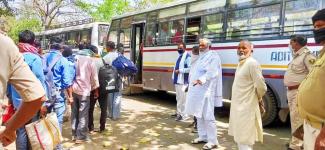
A spate of migrant workers walking back home in extreme distress, more deaths caused by anti-worker, anti-poor polices of Central and State governments than by Corona, the extent of hunger and starvation rapidly increasing, starvmation deaths from Bhojpur to Western Champaran despite government denials—it seems as if the government has deliberately left the poor, the workers and the common people to suffer and die.
Whatever meager relief announcements were made by the government were entangled in various kinds of complications and officials were seen to be merely fulfilling a formality for name’s sake. In this crisis, the common people of Bihar took up the challenge of disbursing rations to migrant workers, rural poor and other needy people, thus epitomizing humanitarian compassion despite governmental cruelty and non-cooperation. Through their initiatives they disproved the false propaganda of the BJP-Sangh against the minority community in the name of Corona. We saw numerous examples of this, from blood donation for the needy by Insaf Manch activists in Muzaffarpur to relief work done by Shaheen Bagh activists in Gadhani.
Nevertheless, incidents of cruelty and attacks by feudal criminals were also seen during this period. Protesting against this, CPIML disbursed relief to the poor and weak sections and also among upper castes, and established a positive contact with them. The relief work included running community kitchens, distribution of dry rations, cleanliness drives, arrangements for basic essential goods, etc.
The CPIML initiatives started early, in the month of March itself. Immediately after the Lockdown migrant workers from Delhi, Punjab, Haryana, Rajasthan and Uttar Pradesh were stopped from entering Bihar at the Mehraun border in Devariya District. Consistent efforts by CPIML Darauli MLA Satyadev Ram succeeded in arrangements being made for those workers to return home. Relief camps were run for migrant workers. Water, Chiwda, oranges, bananas and other food were disbursed among workers. CPIML ran a Corona relief camp at the Lalit Bus Stand in Siwan, led by senior Party leader Amarnath Yadav. Rations were disbursed to 896 families in 9 Panchayats in Raghunathpur including Karsar, Rajpur, Nikhri Kalan, Panjwar, Tari and Dighwalia. Relief work was done among about 200 families in Siwan city. The Party initiatives received extensive cooperation from different sections of society.
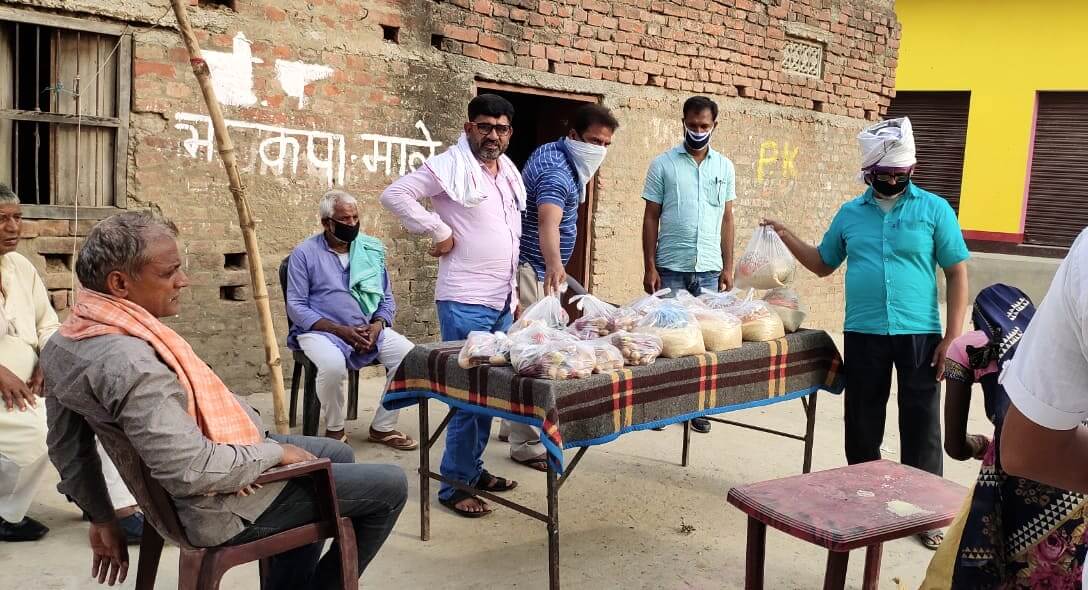
In Bhojpur District a Prevent Corona Jansankalp Campaign was planned in March itself. Large banners were put up in all the Blocks and an awareness campaign along with soap distribution was decided. During the campaign we saw large scale hunger, especially in Musahar Tolis, and efforts were made to put pressure on the administration for food grains and rations distribution. Lists were prepared in all the Blocks of people who were out of the BPL lists. Immediately after the Lockdown began, Rahul Manjhi had died of starvation in Ara city. CPIML activists pressurized the administration into action, and started ration distribution in poor Tolas. 35 families in Jawahar Tola and Musahar Toli of Ara city each received 8 kg rice and 2 kg atta. AISA activists distributed rations to 150 families in Chandwa Musahar Toli, each family receiving 5kg rice, atta, potatoes and soap.
Of the 60 landless Ravidas families in Khanani Khurd village, 20 had not received government rations. 5 of the 20 Paswan families did not possess ration cards. 2 of the 100 Sao (Kanu) families and 32 of the 150 Yadav families did not have ration cards; 3 of the 8 Brahmin families did not have ration cards. A dharna was organized against this and the administration was made to distribute 2 months’ rations to 34 card-holders and other non-card holding families.
At Panwari village in Tarari Block 700 families were each provided 3 kg rice and 1 kg potatoes through the efforts of Party comrades and local supporters. A list of 1494 families from 12 Panchayats was prepared and sent to the Zonal Officer with demands for ration and relief materials. 62 families in Karisath Musahar Toli were provided 10 kg wheat, 5 kg rice and 1 kg dal. 82 families in Masadh village were provided 5 kg rice, 5 kg wheat, 1 kg dal and 1 cake of soap through the village Mukhiya and the PAKS Head. Pressure was put on the Sandesh Block administration to provide relief to 57 families. Similarly, pressure was put on Koilvar City Panchayat Head to 5 kg atta each to 90 families and the Party Committee provided 10 kg atta each to 33 families. Soap is being disbursed in dalit Mohallas in every Block. Lists are being prepared of names which are not included in BPL lists and efforts are being made for rations for them. A community kitchen in the name of Comrade Ramnaresh Ram was started at Ahiro in Ara to provide food for the needy. The local Party Committee is running this kitchen with help from supporters.
Initiatives from the Party and Shaheen Bagh activists have distributed rations to 1007 families in Gadhani Block, including dalit, mahadalit and minority Mohallas and Tolas. This cooperation enhanced and strengthened our rapport with the minority community and anti-NPR-NRC-CAA activists. As a result, they participated in large numbers in the ‘Thali Bajao Ration Do’ campaign called by the Party. Shaheen Bagh activists collected Rs 90,000 in contributions and this was used for relief materials like dry rations and soap for distribution in needy Mohallas and Tolas. CPIML Panchayat representatives also led and participated vigorously in relief work. Relief work was done in Rajput dominated areas also. Upper caste poor in Kurmuri village, once known for their feudal dominance, praised CPIML relief work and also benefited from it. The names of medium farmer families who were in distress but could not say so openly (whose situation became known to us during the course of our surveys) were also added in the list of needy families for ration distribution. A Party activist who is a teacher gave half his salary as contribution. Shopkeepers in Gadhani Bazaar contributed rations. Farmers who were able to contributed rice and wheat.
The poor in Deodhi village in Agiaon constituency (which is also the paternal home of the present JDU MLA) were not getting rations from the dealer. The dealer is the MLA’s brother and his wife is a member of the District Council. During our relief work here we found that the villagers were clearly angry against the MLA.
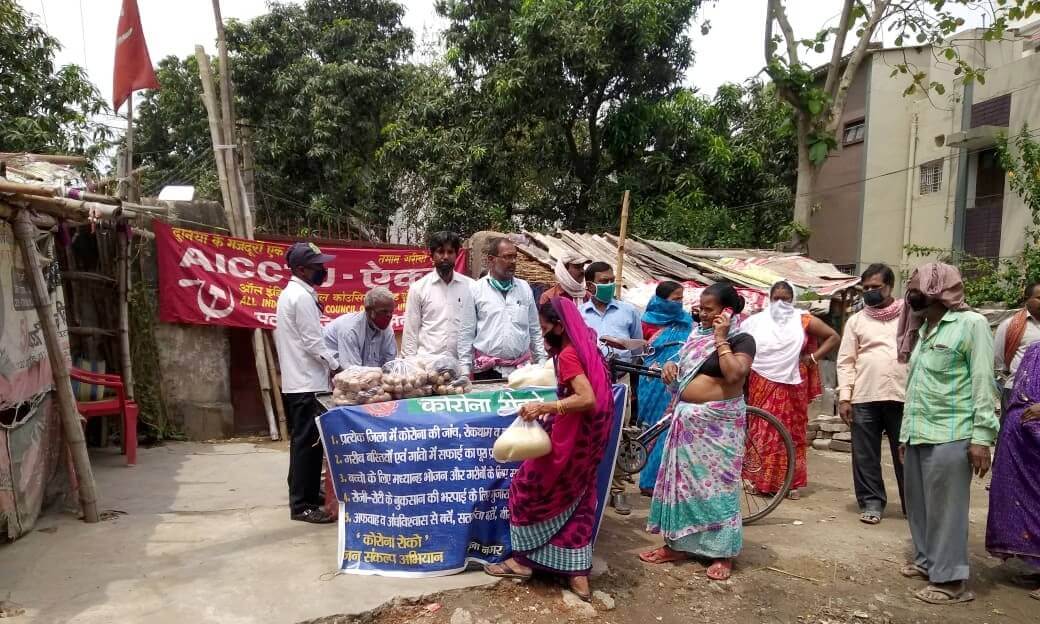
Relief work was started in Muzaffarpur District also soon after the Lockdown was announced. 2000 masks were distributed among the rural poor, railway workers and police personnel. From 6 April to 25 April dray rations (food grains, potatoes, salt, soap etc.) were distributed regularly among rural poor and footpath dwellers. 2500 poor families were covered in this ration distribution. Rations were also distributed to 500 families of Party activists who come from the working class. Pressure was also put on the administration for ration distribution and better arrangements in quarantine centers.
In addition to ration distribution by Insaf Manch and CPIML activists, 4 units of blood were donated for the operation of 10 year old Muskan from a very poor family. Aftab Alam, Khalid Rahmani, Matlubur Rahman and Majid Siddqui were the blood donors. Similarly, blood was donated for other patients including a plastic anemia patient by Akbar Azam Siddiqui and Yasser.
Daily food distribution and dry ration distribution was done for 30 days among 500 families at Kankarbagh in Patna City. Despite consistent non-cooperation from the administration, the Party distributed rations to 381 families in Digha, 213 families in Gulzarbagh and 700 tempo drivers. Lists of needy persons, including 84 women in Ashiana, Patna were prepared and submitted to the concerned officials.
Soniyawa Panchayat Mukhiya (CPIML) in Dulhin Bazaar, Patna Rural has prepared a well-arranged isolation center for migrants from outside to prevent the spread of Corona.
Consistent relief work amd ration distribution was also carried out in Gaya and Darbhanga. At Chandanpatti in Darbhanga, the Party took initiatives to counter stigmatization and boycott of Muslim vegetable vendors. Similar initiatives for relief work were also carried out in other Districts.
MLAs' Struggle for Return Home of Migrant Workers
The migrant workers’ suffering-filled odyssey on foot still continues. Around 600 people have died so far due to the cruel policies and behavior of governments during Lockdown. Many of these are workers from Bihar. More deaths have occurred due to road accidents, hunger and other reasons than due to Covid19. At the beginning of the Lockdown the Nitish Kumar government had openly declared that migrant workers would not be allowed to enter Bihar. For a long time the administration was busy trying to find ways to obstruct entry of workers into the State, but under pressure from agitations the government was finally forced to allow migrant workers to enter Bihar.
While the Bihar government and leaders and MLAs of ruling parties like BJP and JDU showed appalling cruelty towards migrant workers, left them to fend for themselves and even die and made them ‘untouchable’ by practicing social distancing, CPIML MLAs on the other hand from day one put their own lives on the line in their unceasing efforts to facilitate the return home of migrant workers. In the second phase of the Lockdown they kept a close watch on the conditions at quarantine centers and made arrangements for rations for migrant workers, rural poor and other needy persons at their personal level as well as by putting pressure on the administration.
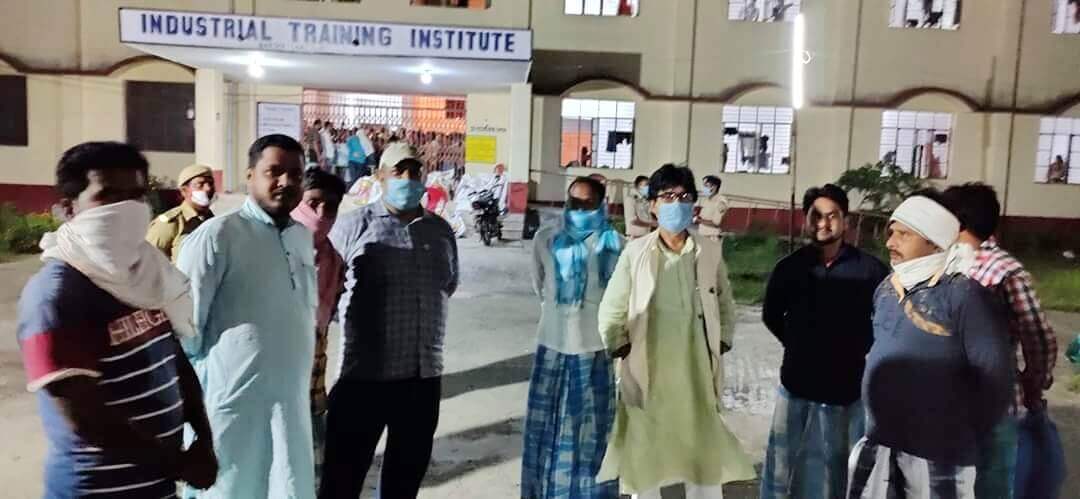
Migrant Workers Stopped from Entering Bihar
The three current CPIML MLAs Mahboob Alam, Sudama Prasad and Satyadev Ram were in consistent talks with the government and local administrations and were in correspondence with the Bihar government and other State governments for necessary steps to be taken for the safe return home of migrant workers. They demanded relentlessly from the Bihar government that in this hour of crisis the government should abandon autocracy and accept cooperation and coordination from the Opposition. It was this pressure that forced Nitish Kumar to hold a meeting with all opposition parties. Former MLAs Amarnath Yadav, Arun Singh, Chandradeep Singh and other party leaders were also constantly active in relief work during the Lockdown.
Migrant workers were finally allowed to enter Bihar due to initiatives by CPIML MLAs. On the third day of the Lockdown about 150 migrant workers walking home arrived at the UP-Bihar Mehrauna (Siwan) border at about 8 PM on 27 March. As Nitish Kumar has made a horrifically anti-worker declaration that no migrant worker would be allowed to enter Bihar, the Siwan administration refused to allow these workers to enter into the State boundary. Attempts were being made to forcibly send all the workers back in a truck. CPIML MLA Satyadev Ram came to know about this. He immediately reached the border and contacted the local administration who also arrived there soon. The BDO cited the government order; Satyadev Ram vociferously opposed this and said that we shall not comply with these blatantly anti-worker and anti-humanitarian policies of the government. The situation was becoming increasingly tense and the administration spoke to their superior authorities. Satyadev Ram sat on a dharna on the spot. The administration had to bow down before his firm attitude. Led by Satyadev Ram, the migrant workers walked about 1 ½ km from the border to RBT College where arrangements for their accommodation were made. At the initiative of the MLA, 2 quintal chooda (beaten rice) and jaggery were immediately disbursed to all the workers. Just then news came of 500 more workers not being allowed to enter the border. Initiatives were again taken to allow these migrant workers inside and for arrangements to accommodate them. By the time they were registered and sent to the same college, it was 3 AM. In the morning Satyadev Ram personally made arrangements for chooda and jaggery for all the workers. This center was run solely on the Party’s initiative. Satyadev Ram spoke to the media and demanded that the government should make arrangements for sending all the workers safely back to their Home Districts. Seeing the tardiness of the government, the MLA personally arranged 2 buses. This had an effect on the administration and they also arranged buses. 4 quarantine centers were made at Jeeradei, Mairwa and 2 other places and the migrant workers were taken to these centers where arrangements for their food and stay were made. At the initiative of the MLA, arrangements for chooda-jaggery at the Mehrauna border were also made. Grapes, oranges, bananas and other food items were also provided. This center also ran on the Party’s initiative till 9 April. About 22,000 workers were sent to their Home Districts through the efforts of the MLA.
CPIML Relief Camps
Relief camps were organized at the initiative of former MLA Amarnath Yadav. A Corona relief camp was organized at the Lalit Bus Stand in Siwan. Rations were distributed to 896 families at 9 Panchayats in Raghunathpur including Karsar, Rajpur, Nikhli Kalan, Panjwar, Tari and Dighwalia. Relief work was done for about 200 families in Siwan city. CPIML initiatives received widespread support and cooperation from various sections of society. Melons and essential rations were distributed to about 2500 migrant workers in Raghunathpur constituency.
Consistent initiatives were also taken by Tarari (Bhojpur) MLA Sudama Prasad. After the Lockdown he constantly received calls from migrant workers stranded in various parts of the country. He sent letters to Principal Secretary of the Bihar Disaster Management Department, Bihar Bhavan in Delhi, Bhojpur DM, and Bihar Assembly Secretary for rations and safe return home of about 60,000 migrant workers stranded at about 150 different places in the country, resulting in suitable interventions in some cases. Similarly, Mahboob Alam was also constantly active for the safe return home of workers from Seemanchal.
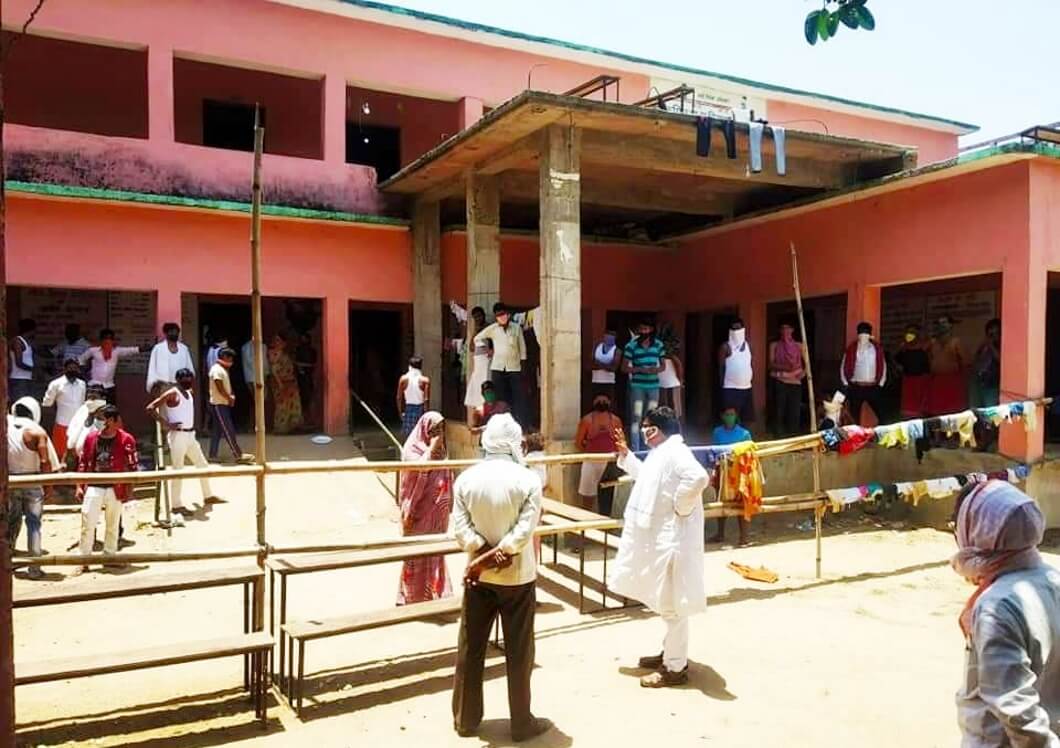
Horrific Quarantine Centers
CPIML MLAs raised their voice against the horrific conditions prevailing in quarantine centers. The government has turned these quarantine centers into torture chambers, and the inmates are being stigmatized as if they are responsible for the spread of Corona across the country. The elitist mentality of ‘social distancing’ is being epitomized here, whereas ‘physical distancing’ is completely missing. People are crammed like sheep into small spaces. If even one person gets infected with Corona, it will be impossible to save anyone. The condition in these centers is worse than that in jails.
Reports are coming consistently from the quarantine centers of half-cooked or spoilt food. People with diabetes and other serious diseases are being given nothing but rice to eat. There are no beds for sleeping. People are unable to sleep for lack of mosquito nets or coils. There are no toilets for women. There is no milk for children. The CPIML MLAs visited these quarantine centers to find out the facts of these inhuman conditions and put pressure on the administration to make proper arrangements for migrant workers and to behave with human sensitivity towards them. These initiatives succeeded to a certain extent in breaking society’s negative attitude towards migrant workers. Many people have started coming forward to help them.
Tarari MLA Sudama Prasad has so far inspected 23 quarantine centers. The conditions in all of them are hellish. Satyadev Ram has visited 20 centers in Siwan including those at Krishnapali, Chakri, Balahu and Son. Mahboob Alam has also visited several centers. Efforts on the part of the MLAs have resulted in mosquito nets, milk for children, etc. being provided at many centers. Administrative personnel have started behaving decently with the workers, clothes and vessels were arranged, fans and lights repaired, and cleanliness improved at many centers.
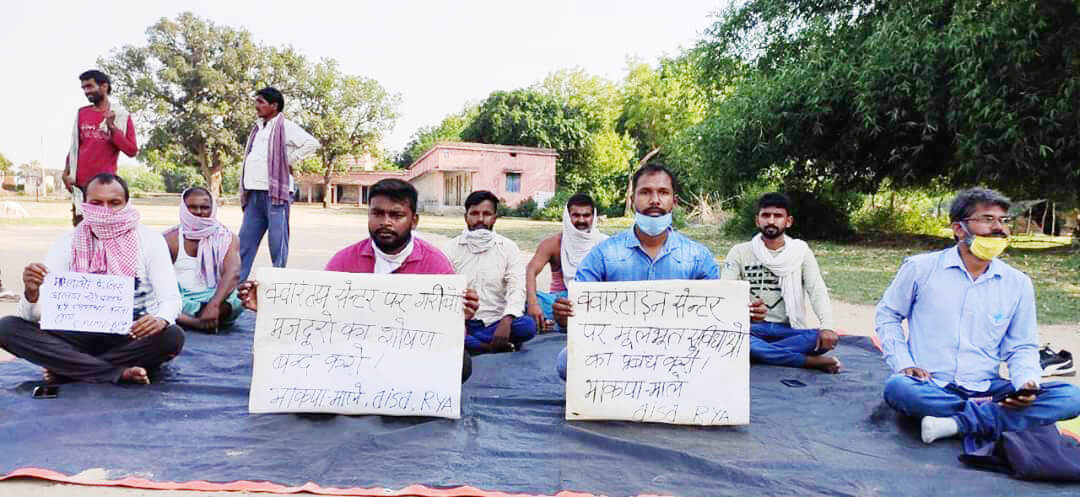
Discriminatory Treatment to Migrants
The CPIML has demanded from the government that the registration process of returning home should be simplified and the number of trains and buses should be increased. They have pointed out the difference in treatment given to elite persons from outside and poor migrant workers. Why this discriminatory treatment?
People returning on Rajdhani trains and elite persons are not being asked to undergo tests; they are allowed to go straight home instead of being quarantined. But migrant workers are sent to quarantine centers which are no less than torture chambers. At many centers the workers are forced to spend the nights in fields due to paucity of space. Dominant sections in villages do not allow them to enter the villages. If prevention of infection is to be ensured, these workers should be given a rapid test and then sent home, where they can remain in home quarantine. Only the persons with symptoms need to be kept separately. The government should adopt a scientific and foresighted policy in this matter.
Give Jobs to Returned Migrants, Implement Labour Laws
The MLAs have also demanded from the government that adequate employment should be generated for workers within the State according to their qualifications. They should also be given grants and interest-free loans to start their work. Many of them are skilled labor and can play an important role in the development of their home State Bihar. The government has also said similar things, but it is a matter of grave concern that working hours have been extended from 8 to 12 hours. This is not only injustice but an attack on the rights won by workers after long struggles. Abrogation of labor laws means that all rights of the workers are snatched away and they will become slaves of their employers. Therefore, our demands are: working hours should not be extended at any cost; give jobs to workers instead of using JCB machines for the Jal-Jeevan-Hariyali scheme; the government has recommended 200 days’ work in MNREGA which is welcome, but at the same time Rs 500 minimum daily wage should be guaranteed; Rs 10,000 Lockdown Allowance and 6 months’ rations for all workers; complete loan waiver and crop loss compensation due to Lockdown, excess rains or hail storms for all farmers at the rate of Rs 25,000 per hectare; Rs 20 lakhs each to the families of all workers killed during the Lockdown.
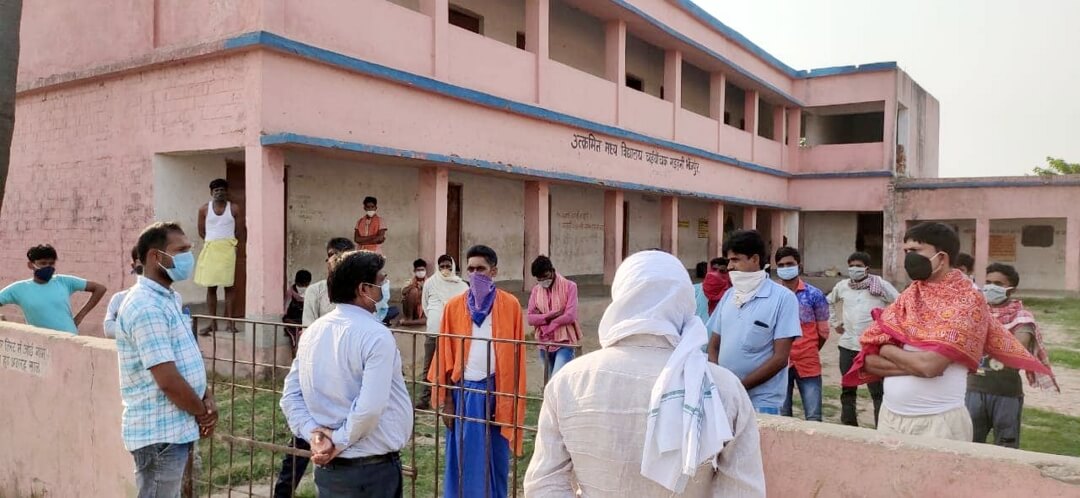
Migrant Workers Volunteer for Quarantine but Government Takes No Heed
A CPIML fact-finding team visited the Quarantine Center Chaiyachak Utkaramit Middle School in Shivpur village in Bhojpur district. There were 35 workers at the school but nobody to take care of them or their needs. These workers were checked up at the Hospital and told to go to the Gadhani High School, but when they went there they found nobody. They then came to their own village and voluntarily climbed over the wall of the school and stayed inside. The Government of India has declared this to be a Red Zone. All these migrant workers have come back from Gujarat.
When no one from the administration turned up, the villagers informed the CPIML, after which the team arrived at the Middle School. The Bhojpur DDC was informed and the BDO was also called. It was only after that the workers got a kit each (soap, sanitizer, mask, lungi, banyan, towel, plate, bowl, glass, comb, bucket and mug).
The BDO came to the spot and assured CPIML activists that arrangements for food would be made from the next day. He requested to manage their food for one day. Accordingly, the party arranged food for them through the efforts of the villagers.
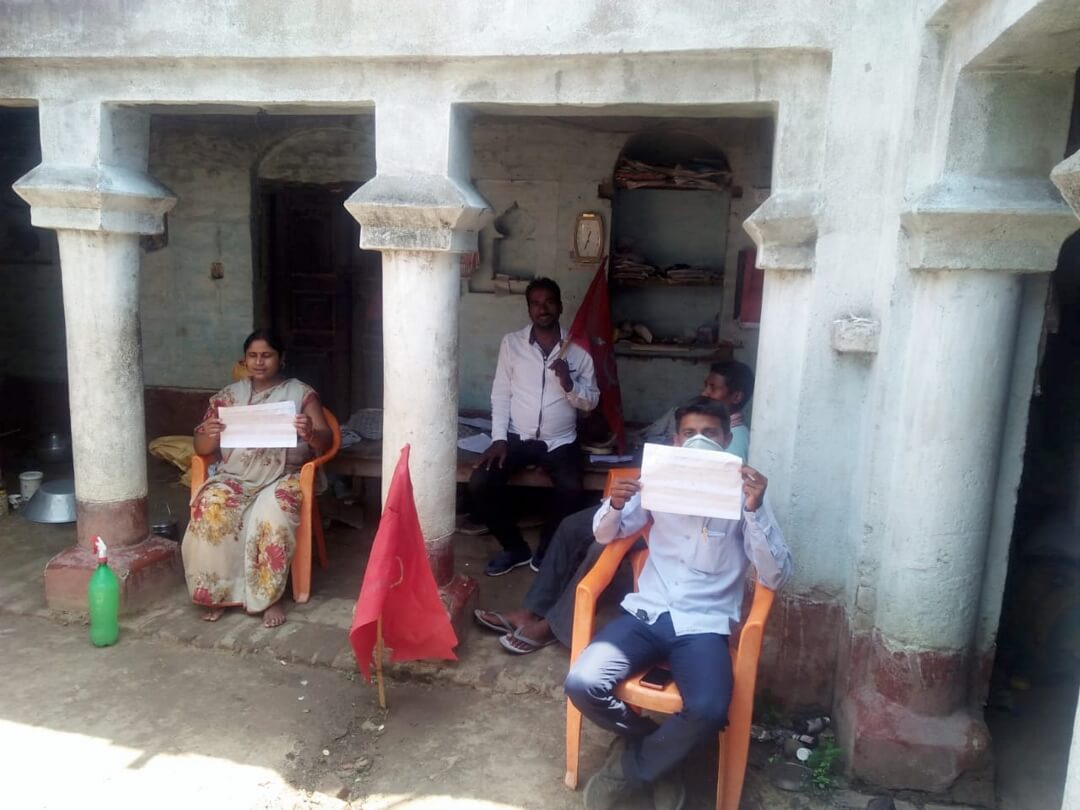
'Corona Maha Loot' Scam
In the quarantine centers the migrant workers are being treated more cruelly and inhumanly than the British Raj used to. The funds meant for migrants are being embezzled in what is now known as ‘Corona Maha Loot’. Big announcements are being made through newspapers of food, milk, biscuits, fruit etc. being disbursed in quarantine centers and good arrangements for sanitation, light and toilets. But reality is the horrifying opposite. CPIML leaders who visited these centers said that after MP Chandeshwar Chandravanshi’s video-conferencing with Collectors, the loot has increased manifold. In view of the increasing protests, heavy police bandobast is being done at the centers. But the real aim is to carry on the loot without exposure and to hush up injustice in the name of safety.
Villagers and Relatives Protest
On 8 May, responding to a call by CPIML, hundreds of farmers and workers including relatives of those interred in the quarantine centers held a dharna, keeping Lockdown rules, to demand proper food and other arrangements at quarantine centers, display boards of governmental facilities available at the centers, suspension of Nauru Quarantine Center in-charge Jehanabad CO, sending quarantine center inmates to home quarantine after proper blood tests. The dharna was held at various places in Jehanabad including the CPIML District office as well as several villages. CPIML leaders said that if quarantine center conditions are not improved, the relatives of those held at these centers would be constrained to hold protests outside the centers. They demanded that if everything is being run properly, why is the Nitish government not putting out the list of quarantine center facilities in the public domain?
On 6 May 2020 a CPIML fact-finding team led by Manoj Manzil visited the quarantine center at Buniyadi Middle School, Agiaon, Bhojpur. They found the conditions to be appalling, lacking in quality as well as quantity of food, sanitation, water, light, fans, mosquito nets, toilets, spraying of bleaching powder and women’s safety arrangements.
Initiatives by Darbhanga CPIML for Workers Stranded in Uttar Pradesh
Immediately on receiving news of the pitiable condition of workers from Pratapgarh District in Uttar Pradesh who had been brought on agreement in November to work in the brick kiln at Pirdi Chakka in Bahadurpur Block, Darbhanga District. Their ‘masters’ were stopped from using them as bonded labor during the Lockdown through the initiatives of Party leaders and the Local Committee. They were 12 workers from Pratapgarh District near Allahabad, including Bablu Ram, Brajesh Ram, Ankit Ram, Maley Maurya, Dilip Kumar Ram, Gautam Paswan and Ram Naresh Saroj. Since work at the brick kiln had stopped, these workers were eking out a living by using their horse and cart to ferry hay from nearby farmers’ fields. But the kiln owner found even this objectionable and he confiscated the cart tires and the horse. They were not given food on time and the kiln owner kept threatening to send them to jail. Party leaders took initiatives and brought them from the brick kiln to Sathe Math in Chhapra and made arrangements for their food and stay.
The workers, relating their woes, told us that as per the agreement they had been brought to the brick kiln to transport dry bricks till the month of June. They could work for only 2 months at the kiln. Brick making work at the kiln came to a standstill because of lack of workers. The workers requested the owner that they should be allowed to go home and they would repay whatever advance is in their name by working it off in the next season. But they were not allowed to leave, and they were not given any work either. Thus, they were finding it difficult even to get enough food. The administration was informed of this incident. The Zonal Officer came and met the workers in the evening and gave assurance for a prompt resolution of the issue. On 27 April the administration took initiative to arrange talks between CPIML leaders and the kiln owner. An agreement was reached during the talks that the kiln owner would look after all the workers, and after the Lockdown ended he would also make arrangements for the workers to be sent home. In case of any complaints in this period, the administration would be free to file a case against the brick kiln. The kiln owner was made to return the workers’ horse and cart. The debt of the workers amounting to more than Rs 1 lakh was cancelled. AIARLA leader Jangi Yadav said that he was satisfied that their initiatives had succeeded in obtaining justice for the workers.
Against Boycott of Muslim Vegetable Vendors
Chandanpatti village is next to Bekuli village in Darbhanga District. The Kunjda Muslim community forms a good part of the population here and they are engaged in the work of growing and selling vegetables. During the Lockdown some people, instigated by hatemongering by BJP-RSS, started stigmatizing them and forbidding them from coming into the village to sell their produce. CPIML activists took initiatives to discuss and debate with people on this issue and changed the atmosphere of hatred and boycott. The activists took initiatives to go and buy vegetables from this community, thus opening the market for them. Similarly, a market was organized for Muslim women in Pirdi village to sell their vegetables. Similar initiatives were taken in Basatpur village also.
Liberation Archive
- 2001-2010
-
2011-2020
- 2011
- 2012
- 2013
- 2014
- 2015
- 2016
- 2017
- 2018
- 2019
-
2020
- Liberation, JANUARY 2020
- Liberation, FEBRUARY 2020
- Liberation, MARCH 2020
- Liberation, APRIL 2020
-
Liberation, MAY-JUNE 2020
- Stand With the Cyclone Ravaged Areas and People : Donate Generously to Relief Efforts
- The Lockdown Has Unlocked India's Suppressed Social Reality of Migrant Workers
- Modi's Covid19 Stimulus Package: Monumentally Deceptive and Disastrous
- Enslaving India's Workers and Renting Out India To Global Capital Is Not the Way to Self Reliance
- Dealing with the Lockdown: Precious Lessons from the Unique Experience of an Unprecedented Phase
- Remembering Ambedkar amidst the Covid19 Pandemic and Lockdown
- May Day 2020 : International Day of Workers in Times of Global Pandemic
- The 202nd Birth Anniversary of Karl Marx
- Experiences of Relief Work in Bihar: Government Abdicates, People take Initiative
- Lockdown Emboldens Feudal, Communal and Criminal Forces
- The Girl on a Bicycle
- Will the Government Not Give Us Jobs?
- Migrant Workers of Jharkhand Stranded in Maharashtra During Lockdown
- Lockdown Relief Reports from Uttar Pradesh
- The Varanasi Mohalla Kitchen Experience
- CPIML Activities in Kerala during the Lockdown
- Initiatives in Tamil Nadu During Lockdown
- Covid 19 Lockdown Relief Work in Chandigarh
- Thousands of Distressed Workers in Jaipur Come Out on the Streets
- Relief Work During Lockdown in Delhi
- Invisible but Irreplaceable? Migrant Labour BC 2019 and AC 2020
- Karnataka : Notes on Migrant Workers Assistance Campaign
- The Pandemic and Beyond : Free Quality Healthcare is a Fundamental Right
- Epidemic Act 1897 : A Draconian Colonial Hangover
- Kerala Model Delivers in Covid -19 Control
- A Note on Herd Immunity
- Modi Regime's War on Working Class
- Attacks on Students and Public Education
- The Pandemic's India Journey: Short Takes
- Open Letter to British Labour Party Leader: Don't Align the Labour Party with Allies of Modi's Far-Right Regime
- Facilitating the Corporate Plunder of Kashmir Under Cover of Covid19
- Hunger Strike by CPIML Leader BN Singh Incarcerated in Medini Nagar, Jharkhand
- Hari Vasudevan
- Tribute : Comrade Narender Kumar & Comrade Suhail Akhtar
- Liberation, JULY 2020
- Liberation, AUGUST 2020
- Liberation, SEPTEMBER 2020
- Liberation, OCTOBER 2020
- Liberation, NOVEMBER 2020
- Liberation, DECEMBER 2020
- 2021-2030
Charu Bhawan, U-90, Shakarpur, Delhi 110092
Phone: +91-11-42785864 | Fax:+91-11-42785864 | +91 9717274961
E-mail: info@cpiml.org







